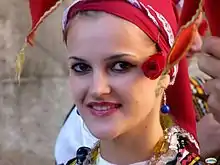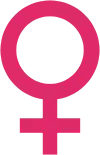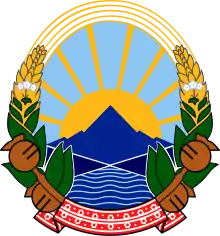Women in North Macedonia
Women in North Macedonia are women who live in or are from North Macedonia. They live in a society in North Macedonia that is customarily patriarchal. Being in a country that was ravaged by internal conflict known as the 2001 insurgency in North Macedonia, North Macedonia's women played roles in peacebuilding during time periods classified as the pre-conflict period, the conflict period, and the post-conflict period.[4]
 A woman in North Macedonia wearing traditional garb | |
| Gender Inequality Index[1] | |
|---|---|
| Value | 0.164 (2014) |
| Rank | 33rd out of 188 |
| Maternal mortality (per 100,000) | 7 (2013) |
| Women in parliament | 33.3% (2014) |
| Females over 25 with secondary education | 40.2% (2012) |
| Women in labour force | 44.7% (employment rate OECD definition, 2019)[2] |
| Global Gender Gap Index[3] | |
| Value | 0.7013 (2013) |
| Rank | 57th out of 153 |
| Part of a series on |
| Women in society |
|---|
 |
Traditionally, the women of North Macedonia perform domestic work. In the field of academics, some women from North Macedonia focus in the study of Humanities. Some women in North Macedonia hold positions of authority. Women receive "inheritance" through the dowry system, because inheritance is traditionally transferred to male heirs. Some modern-day women receive inheritance that is divided among siblings by their parents. The traditional way women greet each other involves exchanging kisses. Traditional medicine is handled by some women of the older generation, who act as faith healers, healing people against illnesses caused by the so-called "evil eye."[5]
North Macedonia made marital rape illegal in 1996.[6][7]
References
- "Table 4: Gender Inequality Index". United Nations Development Programme. Retrieved 15 December 2015.
- https://stats.oecd.org/Index.aspx?DatasetCode=LFS_SEXAGE_I_R
- "The Global Gender Gap Report 2013" (PDF). World Economic Forum. pp. 12–13.
- MACEDONIA: How Are Women Faring In Macedonia?, AWID, September 12, 2009, peacewomen.org
- North Macedonia, everyculture.com
- "CRIMINAL CODE OF 1996, AMENDED IN 2004". Archived from the original on 2013-11-04. Retrieved 2013-11-03.
- Social Change, Gender and Violence: Post-Communist and War Affected Societies at Google Books
